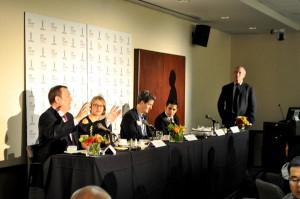Top campaign aides, students dissect election
With the 2012 presidential election over, students, faculty and alumni dined Thursday night over a post-election panel discussion with top campaign strategists and student organizers at the Davidson Conference Center.

Post mortem · Panelists Larry Grisolano (left), Kaya Masler, Greg Sefain and Alex Yebri break down the 2012 election cycle in a discussion moderated by Dan Schnur (far right), director of the Jesse M. Unruh Institute of Politics, at the Davidson Conference Center on Tuesday. – Mindy Curtis | Daily Trojan
The event, hosted by the Jesse M. Unruh Institute of Politics, began with an introduction by USC College Democrats President Aaron Taxy and USC Trojans for Romney Executive Director Greg Sefain, both of whom highlighted the enormous amount of work exerted by students in supporting both campaigns in 2012.
The panel featured Larry Grisolano, a senior advisor for President Barack Obama’s 2008 and 2012 campaigns; Bob Wickers, a senior advisor for the Mitt Romney’s 2012 campaign; Kaya Masler, president of USC Students for Barack Obama; and Alex Yebri, president of USC Trojans for Romney, The panel was moderated by Dan Schnur, director of the Unruh Institute.
Schnur started the discussion by looking at the beginning of the election. To Wickers, the Republican primary served as a significant hurdle for the Romney campaign.
“It just entailed a very long, very expensive primary,” Wickers said. “There’s no sense complaining about it. You have the cards and you play them.”
Though Romney was perceived as a strong candidate on economic issues, Yebri said he believed the governor’s main challenge was gaining the public’s trust.
“People knew the economy wasn’t doing well,” Yebri said. “But they didn’t know if they could trust Romney on key issues.”
After discussing the start of the race, the panel discussion changed focus to the subject of key voters in the election, particularly women and minority groups. Masler said she believes changing American demographics served as one of the major structural limitations for the Romney campaign.
“The structure is looking different than it did four years ago,” Masler said. “We see people vote who would have never voted before. That was an advantage for the Obama campaign having some experience with that in 2008.”
Looking to the future, the panel discussed the possible challenges and opportunities in the 2016 election. Masler said Democrats should be wary about reading too much into any demographic advantage.
“Obama is going to have to do something big,” Masler said. “He has held a lot of people’s hopes and dreams for a really long time now. As Democrats, it would be really unwise for us to take this shift in minority votes to assume that we will win elections from here on out.”
Yebri, however, acknowledged that the Republican Party needs to adjust its strategies as a result of changing demographics.
“We have to embrace it — we have to compromise,” Yebri said.
Looking forward, the panelists discussed the challenges that both parties will face in the next presidential election. Despite these challenges, Yebri remains optimistic about the Republican Party in 2016.
“I see a lot of optimistic, beneficial people who can come to the forefront and change the vision of the Republican Party,” Yebri said.
Wickers highlighted the challenge Democrats will face in energizing a coalition that has been very loyal to Obama.
“It’s going to be very hard for Hillary Clinton to hold,” Wickers said. “It’s going to be very hard for Joe Biden to hold.”
According to Wickers, the next election will have to be a grassroots effort.
“It’s got to be friend to friend, neighbor to neighbor,” Wickers said. “It can’t just be paid advertising.”
In closing, the both guest speakers left the audience with the big takeaways from the 2012 election cycle.
The power of social media, Wickers noted, was biggest takeaway in this election.
“We have this new thing that is social and dynamic,” Wickers said. “For me, I think Twitter has been the most powerful thing to come out of this election.”
Grisolano said a more knowledgeable electorate will allow for elections that focus more on important ideas and issues.
“There’s a more sophisticated electorate than ever before,” Grisolano said. “There’s a smarter electorate out there that is more accessible to a thoughtful candidate with a concrete vision and an idea of how to get there, and I think we can have a more ideas election because of it.”

Comments are closed.